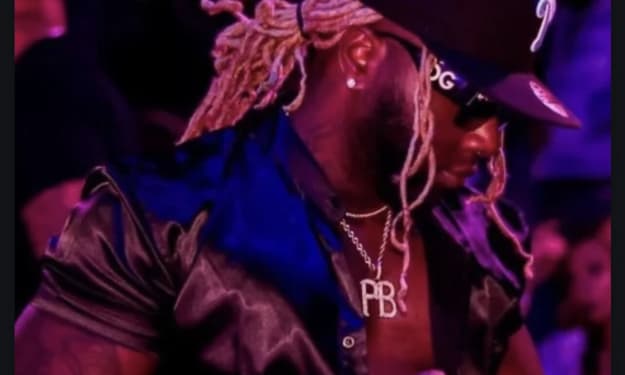"Man's Not Hot": Humorous Lyrics vs. Straight Parody
How a Simple Parody Had Me Ruminating on the Art of Lyric Writing

I am aware that I am especially late to writing about this topic. Though I did hear the song the other night in a club, so I would consider it’s popularity to still render it as a tentpole event.
So, "Man’s Not Hot" by Big Shaq. I love this song… now that I know it is a parody. I became aware of it through a gaggle of YouTube thumbnails labelled "The Ting Goes Skraa," but mostly stayed away from the audio itself. Then, as my job involves music, I heard the main three word hook of the song. Even still, I thought it was just a generic grime song (much like Skepta’s "That’s Not Me" which also relies on a three word hook) and never listened to the rest of the lyrics.
Then, I came across the thumbnail for the full video, and noticed the verified uploaded was listed as Michael Dapaah. My immediate reaction was “Oh, I see what’s going on here…” Thus, I clicked on the video, I obviously appreciate now that the reason it sounds like a generic grime song is that it is a satire of just that. And now I think it’s hilarious and have a sudden urge to “take man’s Twix by force.”
So this got me thinking about why I (or anyone else or for that matter) would confuse this parody with the genuine article. This is not too strange. Anyone who remembers Ylvis’ "The Fox (What Does The Fox Say?)" from 2013 could vouch for this.
The answer, I feel, is humour. Humour is a feature of so many pop, rock and hip hop lyrics. Hip hop and grime especially, use humour and satire as a coping mechanism, to delate the various racial and social issues faced by its artists. Over time this has developed in such a way to attempt to reflect the individual personality if the artist. Humour makes lyrics relatable and gives a series of light winks to the audience often acknowledge common—often "first world"—problems (I’m reminded of a couplet in Ed Sheeran’s "Castle on The Hill": “My first kiss on a Friday night/I don’t reckon I did it right”)
Personally, as a musician, I can remember my own approach to lyrics back in the day. Being a 20 year old northerner armed with an acoustic guitar and no other embellishments or band members, I felt I had to be quirky and possess a level of wit befitting of a comedian or similar raconteur. A smattering of unnecessary swearing (probably only 12 rating stuff, but still) and cringe worthy innuendos followed. It physically hurts me to type out the couplet: “I’ll take you for a ride on the end of my rocket/ You’re small you’re cute and you fit in my pocket” but I ACTUALLY wrote that, almost as an in song chat up line no less!
An English turn of phrase would also pop up occasionally too such as “Pretend I don’t give a monkey’s toss” I don’t use this quirkiness anymore and for what I think are very good reasons. I’ve grown out of it, and these days favour an approach based more on direct emotion, feeling and solid word arrangement. When I write now, it’s more about me and my genuine experiences rather than the image I felt I should project as Jake Thackray/ Loudon Wainwright III type soloist. I mean I wrote a song called "Yesterday’s Girl" once, about cheating on one’s girlfriend, purely for the sake of being subversive. It’s all a question of age and improvement.
Humour in music stems, most likely, from its relationship with other forms of art and entertainment such as poetry, theatre, storytelling, vaudeville etc. Songs of 100–150 years ago did not act as interludes between the comedy routines, they were part of the comedy.
But as times have changed and music asserted itself, so many artists and songwriters emerged that use humour only sparingly. Most of Bob Dylan’s lyrics rely less on his dry humour and more on his use of vocabulary and bold—as well as political—statements. Leonard Cohen likewise, being that he was a published poet before ever signed a record deal—approaches lyrics a more methodical seriousness. And if it was good enough for them, it’s good enough for any of us.
Another factor in the effectiveness of a parody/pastiche is an artist’ image. This could be their video, overall look, song and speech patterns, you name it. Parody bands of old such as The Rutles and Spinal Tap were eerily close to their subjects not just because of the song a like songs, but because of the respective images of The Beatles as cheeky, almost family entertainers who morph into serious free thinking artists, and the numerous band Spinal Tap ridiculed as controlling ego-maniac rock stars.
I mentioned "The Fox (What Does the Fox Say)" earlier and how in 2013, I achieved such a level of viral popularity that it was easy to mistake for the real thing. In fact, Ylvis are a Norwegian comedy duo who made the song to promote their new TV series, though I imagine to poke fun at nonsensical dance music too. This demonstrates both the power of YouTube in promoting this music, but also the western fascination with "foreign" music. The year prior PSY’s "Gangnam Style" went super viral. It’s easy to suggest that "The Fox" rode its coattails. It’s also fairly easy to suggest that Ylvis played an excellent joke on people.
A lot of people who didn’t get the joke on either of these occasions, were all quick to bemoan the state/death of the music industry. I personally think they were missing a point that was very well made by John Seabrook in his 2014 book The Song Machine; where he argues that lyrics of pop songs needn’t be poetic, rather they should just tell you how to feel when listening to them.
What I’m in getting at the end is this; parody is a big part of popular music. If a song, artist or entire genre is parodied, yes it exposes its formulas, ubiquity, and predictability, but also is a testament to its popularity. Part of the reason "Man’s Not Hot' could be mistaken for the real thing is the cynical—and sometimes supported—view that the music industry is desperate and will take anything.
On the subject of humour, I think there has so much popular (and unpopular) music that stands successfully without it. Lyrics needn’t be funny or random or quirky. Their job is to convey and song’s emotion and moods, as Seabrook says. Least of all—as I view my lyrics now—they suffer if fed forced humour. No one needs that.
About the Creator
Richard Brind
Musician/ Music Techie. Contributing to the BEAT sub-feed of VOCAL. I'd like to think I have something to say about Music and pop culture.
PSYCHE/MOTIVATION contributions possible too.
Social Media: https://www.instagram.com/bigbadbrind/







Comments
There are no comments for this story
Be the first to respond and start the conversation.